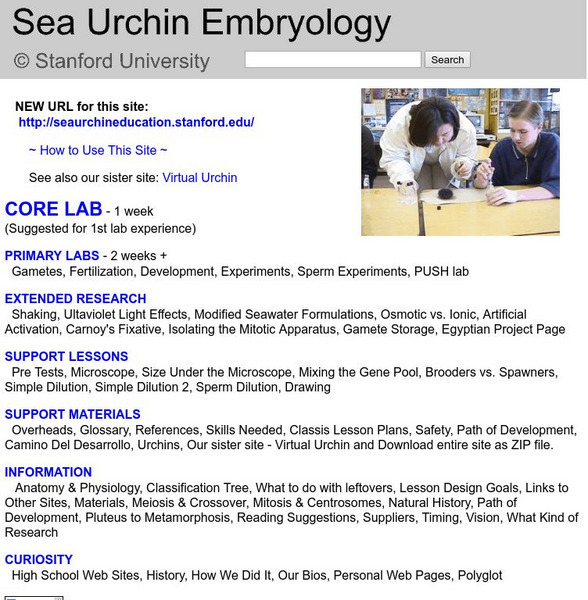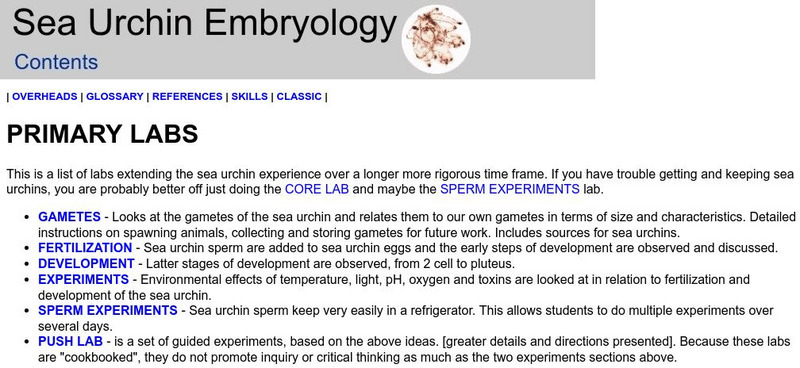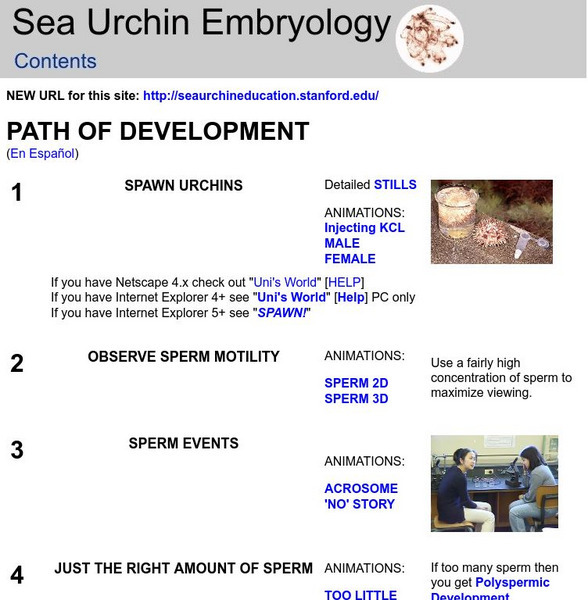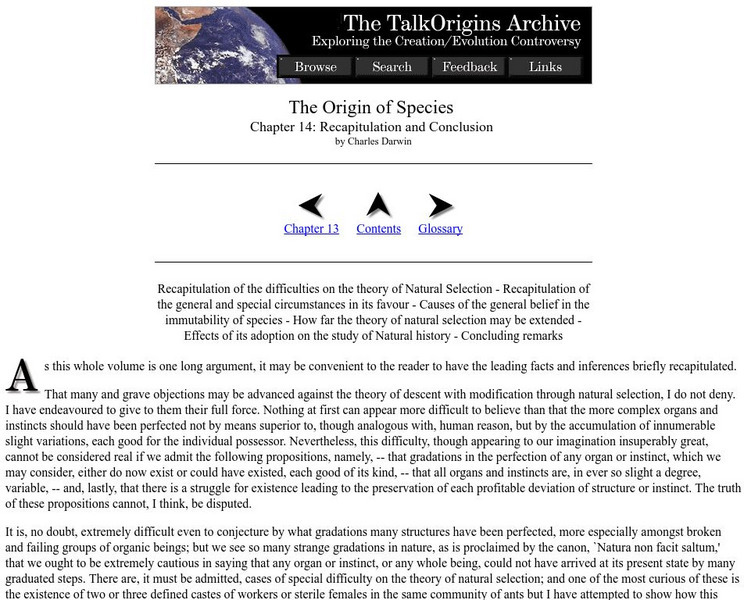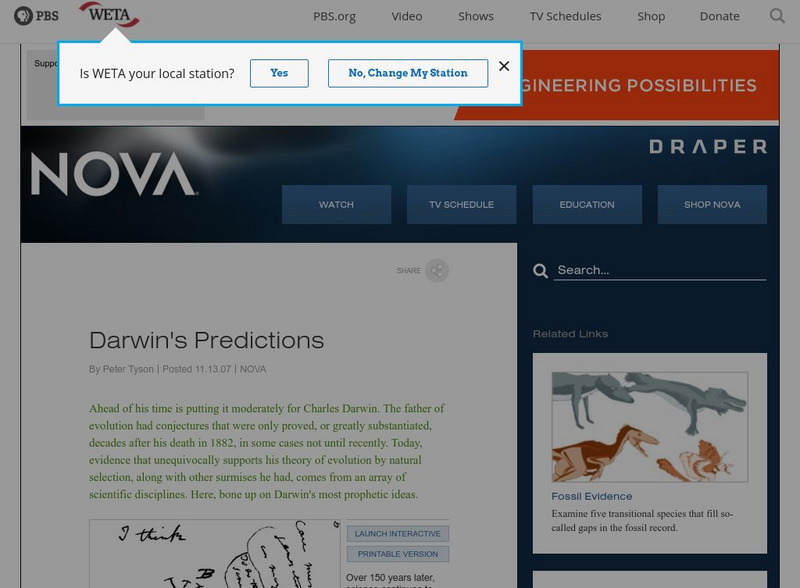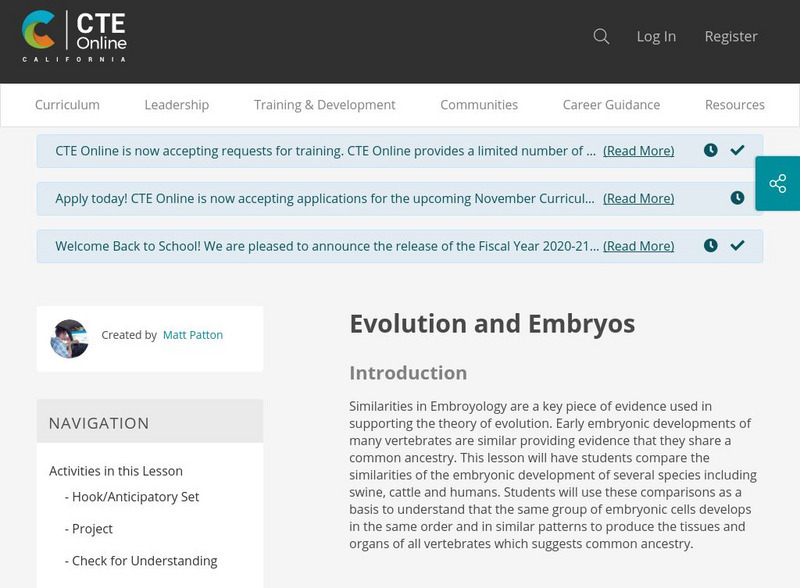Hi, what do you want to do?
Cold Spring Harbor Laboratory
Master Genes Control Basic Body Plans
Have you ever been so tired you missed a major announcement? Eric Wieschaus woke to a call explaining he won the Nobel Prize, but he thought it was just a dream until Christiane Nusslein-Volhard, a co-winner, explained it to him later...
Howard Hughes Medical Institute
Classroom Activities: Stem Cells and Diabetes
How close are we to a cure for diabetes? It seems the cure which has a connection to stem cell research is a possibility! Learners explore the concept of stem cells with an engaging hands-on activity. A PowerPoint presentation provides...
Curated OER
Stem Cell Differentiation Game Questions
Thirty-five multiple-choice questions are spread out into boxes bordered with dotted lines so that they can be cut out to become game cards. Playing a game to review concepts is an effective way to learn, even if you are in college. Give...
Curated OER
Inside the Egg, Hatching Chickens
Students explore how an egg becomes fertilized. In this biology lesson, students "candle" a variety of eggs in order to determine which ones have been fertilized and which ones haven't. Student use paper plates to create a graphic on the...
Curated OER
Embryology Word Search Puzzle
In this biology word search worksheet, students search for 36 terms related to embryology. They check off the words as they find them in the puzzle.
Curated OER
Human Embryology
Ninth graders are introduced to the concept of human embryology. Individually, they complete an exercise in which they determine which trait they got from which family member. In groups, they identify and label the reproductive organs...
Curated OER
Embryology as Evidence of Evolution
Students observe the two major developmental pathways (protostome and deuterostome). They analyze data regarding differences in nucleotide sequences and construct a phylogenetic tree. They observe the similar evolutionary history shared...
Curated OER
Animal Organs and the Study of Reproduction, Embryology and Cancer
Young scholars examine organs from dogs and cats to study reproduction, embryology, and the identification of cancer. They record their observations at both the gross and microscopic levels. They present their information to the class.
Curated OER
Natural Selection and Evidence Worksheet
Matching and fill-in-the-blank exercises give biology whizzes a chance to practice vocabulary associated with evolution. Terms to be reviewed focus on evidence for evolution, natural selection concepts, and some genetics words. You could...
Curated OER
Evidence of Change
Students identify evidence of change in species using fossils, anatomical similarities, and embryology. They identify homologous structures and arrange the steps of fossil formation. Students complete a group of selection of organisms...
Curated OER
Comparative Embryology
Students compare and contrast the embryonic development of human, chicken and fish embryos. They create a detailed outline of similarities and differences among the three embryos at various stages of development.
Curated OER
Elegant Embryology
High schoolers observe embryogenesis in action through early stages of development of eggs. They observe cultures with dissecting and compound microscopes. They draw their egg, record any details and observe for changes. They compare...
Curated OER
Comparative Embryology Using Japanese Medaka Fish
Students conduct an experiment to control the breeding of Japanese Medaka fish. They collect the fertilized eggs and view and record the fish's embryological development daily to compare the stages to human development.
University of North Carolina
Embryo Images Online
Understand mammalian embryology through these photos. Each photo contains descriptive text.
Stanford University
Stanford University: Sea Urchin Embryology
A fantastic set of lab exercises, background information, teaching materials and references. Great for high school biology.
Stanford University
Stanford University: Sea Urchin Development: Core Lab Exercise
See sea urchins as they develop. A complete set of instructions for a lab in developmental biology. Excellent supporting material is provided, including troubleshooting information.
Stanford University
Stanford University: Primary Labs
This set of exercises provides well written procedures and background for labs at basic and advanced levels.
Stanford University
Stanford University: Path of Development (Animal Developmental Pathways)
An exciting explanation of animal development using sea urchins as a model. Animations, still images and supporting explanations make for a great learning experience.
Talk Origins Archive
The Origin of Species, Chapter 14
The entire text of Charles Darwin's book, The Origin of Species is available on this site. This link is specifically for the chapter that discusses embryology as evidence for evolution.
OpenStax
Open Stax: Anatomy & Physiology: The Embryologic Perspective
Students learn how the different stages of embryonic development relate to the adult structures of the central nervous system, and understand the growth and differentiation of the neural tube.
National Institutes of Health
National Library of Medicine: Profiles in Science: Francis Crick Papers
Biographical information about Francis Crick as well as access to an archival collection of his papers, letters, photographs, and notes, including those related to the discovery of the double helix.
Nobel Media AB
The Nobel Prize: Thomas Hunt Morgan and His Legacy
This detailed article from the Nobel e-Museum explores Thomas Hunt Morgan's career and research in genetics. Read how Morgan's work influenced later scientists and the modern scientific world.
PBS
Nova: Intelligent Design on Trial: Darwin's Predictions
The resource examines the prophetic ideas of Charles Darwin. The interactive activity explores evolution, embryology, and the evolution of humans. The activity consists of a printable version, interactive version, and sources for the...
Other
Cte Online: Butte County Office of Education: Evolution and Embryos
[Free Registration/Login Required] A detailed lesson plan with downloadable PowerPoints and student handouts that examines how the study of comparative embryology provides support for the theory of evolution.



















